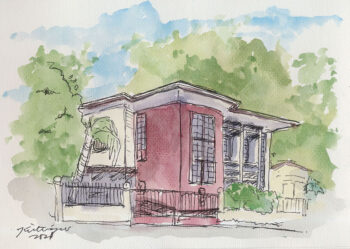MAKATI CITY (MindaNews/02 May) — When we hear about the current slow pace of negotiations between the government of the Philippines and the Moro Islamic Liberation Front, we can lose sight of the many concrete achievements made over the years.
As peacemakers on both sides of the negotiating table try to learn lessons from past peace efforts, two institutions in particular established in the past decade stand out: the Bangsamoro Development Agency, which is currently working on a medium-term Bangsamoro Development Plan, and the Bangsamoro Leadership and Management Institute, which works for “ideologically-oriented and spiritually accountable Bangsamoro leaders and managers who will utilize political and social-economic knowledge and skills.” These institutions are meant to avoid a situation, ever possible in post-conflict situations, where incoming leadership from a revolutionary movement does not know how to operate in a demilitarized governance system.
During the period that these accomplishments were made, since 2001, Malaysia has acted as Facilitator of the GPH-MILF negotiations. This role can be controversial, particularly in light of well-publicized events such as the crisis in Sabah. But there are quieter, less well-known aspects of Malaysia’s involvement, such as assistance from the Malaysian Technical Cooperation Programme (MTCP), a crucial part of the Malaysian government’s thrust toward south-south cooperation. More than 20,000 participants from 140 countries have participated in the various programs administered under the MTCP since its inception in 1980. The program continues to draw interest and participation from a multitude of countries, ranging from the Africa, Europe, Latin America, and Oceania. Nevertheless, qualitatively, the MTCP has a decidedly Southeast Asian focus. Seven of the top 10 countries in 2012 are located in this region. Malaysia provides assistance upon the request from prospective partner countries, and the initiative for cooperation begins with the recipient countries. In short, the program is demand driven.
Malaysia is not typically seen as a “donor” in discussions of overseas development assistance (ODA), nor does Malaysia use that term to describe its development cooperation with other countries. Malaysian assistance to other countries is part of a wider trend of “new development actors” working to extend assistance overseas, often in ways that more traditional donors (the U.S., UK, or Australia) might not do. Therefore, unlike conventional foreign assistance programs, which are often linked to donor values and priorities, MTCP strives to represent an approach of “prosper thy neighbour” and “mutual benefit” in its partnerships. This approach has been applied with regard to Muslim Mindanao.
The April 27 launching of an association of Bangsamoro graduates of the MTCP is an important occasion, given the need for a cadre of trained professionals to implement by 2016 the transition to a Bangsamoro as envisioned in the Framework Agreement signed in October 2012. The Moro Islamic Liberation Front, and the Bangsamoro generally, will need to look at an expanded talent pool beyond current employees of the Autonomous Region in Muslim Mindanao (ARMM – which will be replaced by the new Bangsamoro) and those currently active in the MILF-led transition. An alumni association that taps the 59 MCTP trainees is an ideal beginning. A similar pool of a total of 326 young people has over the years been supported by USAID to undergo a training in public administration followed by participation in the Congressional Internship Programs for Young Mindanao Leaders (CIPYML), and AusAID has the Philippines Australia Human Resource and Organisational Development Facility that includes a focus on Mindanao. From such pools a “registry” of potential Bangsamoro leaders and managers (both current ARMM civil servants and potential new ones) can be developed. Such a database can be drawn upon as preparations for a Bangsamoro Transitional Authority – perhaps in 2015 – move forward.
A strong cadre of civil servants is particularly important inasmuch as the Framework Agreement for the Bangsamoro specifies that the Bangsamoro will have a “ministerial” form of government – a parliamentary system rather than the “presidential” system of separation of powers in both the national and local Philippine government. Rather than a chief executive (e.g., a mayor, governor, or president) elected separately from the legislature for a fixed term, the new Bangsamoro will have a chief executive elected by the legislature for as long as the executive retains the confidence of the legislature. A cabinet will be appointed from the legislature (in some parliamentary systems cabinet members retain their legislative seats; in others they resign to serve in the cabinet).
The point here is that, as the Framework Agreement says, once there is a ministerial form of government, “The Bangsamoro Transition Authority may reorganize the bureaucracy into institutions of governance appropriate thereto.” In presidential systems, typically the chief executive appoints many layers of the bureaucracy: in the Philippines, this includes cabinet secretaries, undersecretaries, assistant secretaries, and even directors. In parliamentary systems, typically just the top one or two political leaders of a cabinet department are political appointees; the rest (up to the very top level) are permanent civil servants. A reason for this difference is that in a parliamentary system the duration of an executive government is uncertain – it is only in power as long as it retains the confidence of the legislature. Rather than fixed terms, and fixed intervals between elections, there is uncertainty. An election can be called any time that a government cannot sustain support from the elected members of the legislature. Thus, continuity of services and processes in the bureaucracy rests in the top-level bureaucrats.
In the process of setting up the Bangsamoro Transition Authority to replace the ARMM, the average ARMM civil servant is being assured of retention (as long as they are not “ghosts“). But the opportunity to set up a senior civil service is one that the MILF can use to help instantiate its vision of a Bangsamoro beyond the regular election in 2016. The MILF has repeatedly stated that it is open to other forces winning in 2016, but a well-functioning civil service will help ensure that the post-2016 Bangsamoro serves the citizens of the region well.
(Dr. Steven Rood is The Asia Foundation’s country representative in the Philippines, and represents the Foundation as part of the International Contact Group for the GPH-MILF negotiations. He can be reached at srood@asiafound.org. The views and opinions expressed here are those of the individual author and not those of The Asia Foundation. This piece first appeared in The Asia Foundation’s “In Asia weekly insight and analysis” http://asiafoundation.org/in-asia/2013/05/01/muslim-mindanaos-cadre-of-new-leaders-and-managers/. Permission to reprint granted to MindaNews by the author).







